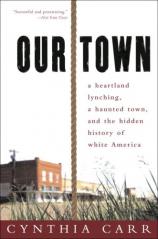Our Town: A Heartland Lynching, a Haunted Town, and the Hidden History of White America
Review
Our Town: A Heartland Lynching, a Haunted Town, and the Hidden History of White America
Cynthia Carr is a journalist who found herself caught up in her own
story.
The granddaughter of an emotionally closed, miserly but apparently
righteous man, Carr learned some years later that he had been
complicit in one of America's most savage lynchings. On August 7,
1930, in the small farming community of Marion, Indiana, three
teenaged black boys were dragged from the town jail to be hanged
after brutal mob beatings. The incident was memorialized in a
famous and oft-published photograph that clearly depicts the local
white citizenry, two black bodies swinging above them in the town
square, seemingly sharing a mood of general gaiety, as though they
had come out for a summer's promenade.
The fate of the third individual lifts the story of Marion's racial
violence out of the ordinary, giving it a spiritual dimension that
cannot be ignored. This third boy was James Cameron, who had
accompanied the other two on a malicious lark to steal money from a
courting couple parked in a well-known lover's lane. Recognizing
the occupants of the car, Cameron, who had been holding a gun with
which to threaten the couple, backed out of the enterprise and ran
away. Nonetheless he was identified by his erstwhile accomplices,
after the white man had been shot and killed and his female
companion allegedly raped.
Like the other two, Cameron was pulled brutally from his holding
cell. He witnessed the other teens being attacked, beaten, one
castrated, one impaled with a railroad spike, before being hanged
with ropes that were later cut in small pieces and given out as
souvenirs. But when his time came to be hanged, he recounts, there
was a sudden cry from the crowd, a voice insisting that he not be
killed, that he had had nothing to do with the crimes. Time seemed
to stop and miraculously Cameron was set free, the crowd parting to
let him walk away. He claims that as events developed (he was taken
back to jail and subsequently served time in a penitentiary), many
whites treated him with exceeding kindness, and some openly wept at
his plight and asked his forgiveness.
Cameron became a haunted man whose search for redemptive solace led
him to invent a "Black Holocaust Museum" out of the whole cloth of
his and other battered and destroyed lives. One of the artifacts
for the proposed museum, which he would like to house in Marion
itself, is a hank of the rope used to hang his companions. Cameron
has become a well-known face at Klan rallies, always carrying a
sign that reads, "Stop the Klan! Let decent and freedom-loving
white people breathe some free air." He is one of the characters
whom Carr interviewed and befriended.
Because Carr knew about her grandfather's connection to the
incident, she found herself increasingly wrapped up in the story,
finally moving to Marion to try to uncover the many mysteries on
the town's grim racial rap sheet.
One of the discoveries she made in dialogue with arrogant Klansmen
and blacks still frightened and reluctant to talk was that the
family of the young man who was killed all but forced him to make a
deathbed declaration of forgiveness, and then carried the message
privately to the family of his assailant. Had this remarkable
attempt at reconciliation been known publicly, it might have
starved out the future seeds of racism that continued to grow and
fester in the community.
Carr and Cameron led a push to organize a "day of forgiveness" in
Marion, with mixed results. Racism and the hatred and fear it
engenders are vigorous weeds tending to crop up despite all efforts
to choke them off. Carr acknowledges that "we white people can
always go on thinking we're not connected to anything terrible.
That's the white illusion, and it's tough to drop."
Reviewed by Barbara Bamberger Scott on January 14, 2011
Our Town: A Heartland Lynching, a Haunted Town, and the Hidden History of White America
- Publication Date: March 27, 2007
- Genres: History, Nonfiction
- Paperback: 512 pages
- Publisher: Three Rivers Press
- ISBN-10: 0307341887
- ISBN-13: 9780307341884




